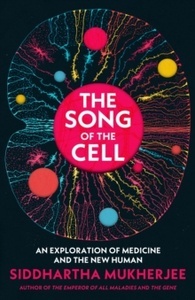The Song of the Cell

Editorial Random House UK
Fecha de edición noviembre 2022 · Edición nº 1
Idioma inglés
EAN 9781847925985
350 páginas
Libro
encuadernado en tapa blanda
Dimensiones 235 mm x 155 mm
Resumen del libro
The Song of the Cell is the vivid, thrilling and suspenseful story of the fundamental unit of life. It describes how scientists discovered cells, began to understand them, and are now using that knowledge to create new humans. Both panoramic and intimate, it is Siddhartha Mukherjee's most spectacular book yet.
In the late 1600s, a distinguished English polymath, Robert Hooke, and an eccentric Dutch cloth-merchant, Antonie van Leeuwenhoek, look down their hand-made microscopes.
What they see introduces a radical concept that alters both biology and medicine forever. It is the fact that complex living organisms are assemblages of tiny, self-contained, self-regulating units. Our organs, our physiology, our selves, are built from these compartments.
Hooke christens them 'cells'.
The discovery of cells announced the birth of a new kind of medicine. A hip fracture, a cardiac arrest, Alzheimer's, AIDS, lung cancer - all could be re-conceived as the results of cells, or a cellular ecosystem, functioning abnormally. And all could be treated by therapeutic manipulations of cells.
This revolution in cell biology is still in progress: it represent
Biografía del autor
x{0026}lt;P x{0026}lt;B Siddhartha Mukherjeex{0026}lt;/B (Nueva Dehli, 1970) es profesor de Medicina en la Universidad de Columbia y oncólogo en su hospital universitario. Ganador de una beca Rhodes, se graduó en la Universidad de Stanford, fue investigador en la de Oxford y se doctoró en Medicina en la de Harvard. Ha publicado artículos en x{0026}lt;I Naturex{0026}lt;/I , x{0026}lt;I The New England Journal of Medicinex{0026}lt;/I , x{0026}lt;I The New York Timesx{0026}lt;/I y x{0026}lt;I The New Republicx{0026}lt;/I . Su libro x{0026}lt;I El emperador de todos los males x{0026}lt;/I (Debate, 2014) fue ganador del Premio Pulitzer en la categoría de no ficción. En Debate también ha publicado x{0026}lt;I El gen. Una historia personal x{0026}lt;/I (2017), que da respuesta a una de las preguntas más relevantes del futuro: ¿Qué significa ser humano cuando se es capaz de manipular la información genética? Actualmente vive en Nueva York con su esposa y sus hijas.x{0026}lt;/P








